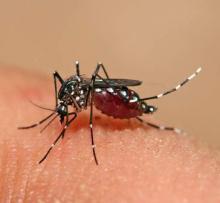The World Health Organization has failed to act decisively in response to the growing Zika virus outbreak, global health experts said in a JAMA viewpoint article published Jan. 27.
While the global public health dimensions of Zika are quite clear, the WHO is “still not taking a leadership role in the crisis,” wrote coauthors Dr. Daniel R. Lucey of Georgetown University and Lawrence O. Gostin of Georgetown University Law Center, both in Washington. They called on the WHO to convene an emergency committee to advise Director-General Margaret Chan about the conditions necessary to declare a Public Health Emergency of International Concern, a process that would catalyze international attention, funding, and research.
“WHO headquarters has thus far not been proactive, given potentially serious ramifications,” the coauthors said. They encouraged the WHO to learn lessons from its handling of the Ebola epidemic, a key one being the need for an “intermediate-level response to emerging crises,” thus avoiding overreaction while still galvanizing global action.
In the interim, Dr. Lucey and Mr. Gostin assert that the international community cannot wait for the WHO to act, as infectious disease modeling anticipates significant international spread by travelers from Brazil – the epicenter of the current outbreak – to the rest of the Americas, Europe, and Asia. The coauthors emphasize seven key international health system strategies that countries should adopt and fund in preparation for a Zika pandemic. These strategies are critical for countries already affected by the virus and those with significant Aedes mosquito populations – the vectors for Zika virus.
The seven health system strategies recommended by Dr. Lucey and Mr. Gostin are:
• Vector control. Mosquito-borne diseases require reducing source populations, including physical and biological controls. Effective mosquito surveillance is also essential to ensure focused interventions.
• Risk communication. Health information campaigns should advise the public to avoid mosquito exposure.
• Enhanced Zika surveillance. The International Health Regulations (IHR) require countries to report unusual Zika-related cases. Countries must train health workers to observe and report Zika-related disease and create robust systems for collecting and analyzing surveillance data to complement public health strategies.
• Travel advisories. To minimize harm to high-risk travelers, agencies should consider issuing travel advisories, which include guidance on reducing mosquito exposure and greater awareness of symptoms. On returning home, symptomatic individuals should report their travel histories to their physician.
• Clinical management. An estimated 80% of Zika infections are asymptomatic, and most of the remainder are self-limited. No specific antiviral treatment is available and care is supportive, with symptoms usually resolving within 7 days. On Jan. 19, the U.S. Centers for Disease Control and Prevention issued new guidelines for pregnant women with suspected or proven Zika virus infection, including an algorithm for offering laboratory testing.
• Accelerated research and development. When Zika infection was seen as usually asymptomatic and self-limited, the coauthors say researchers had little incentive to develop reliable countermeasures. The emerging data on fetal complications have altered this equation, making research on new vaccines urgent. However, a safe and effective Zika virus vaccine is probably 3-10 years away, even with accelerated research.
• Public health emergency declarations. The coauthors say that a national declaration of a public health emergency could help to focus political attention, while financing a surge in resources. They suggest that countries experiencing major Zika virus outbreaks could invoke heightened emergency powers.
Read the complete viewpoint essay in JAMA (2016 Jan 27. doi: 10.1001/jama.2016.0904)
On Twitter @richpizzi


